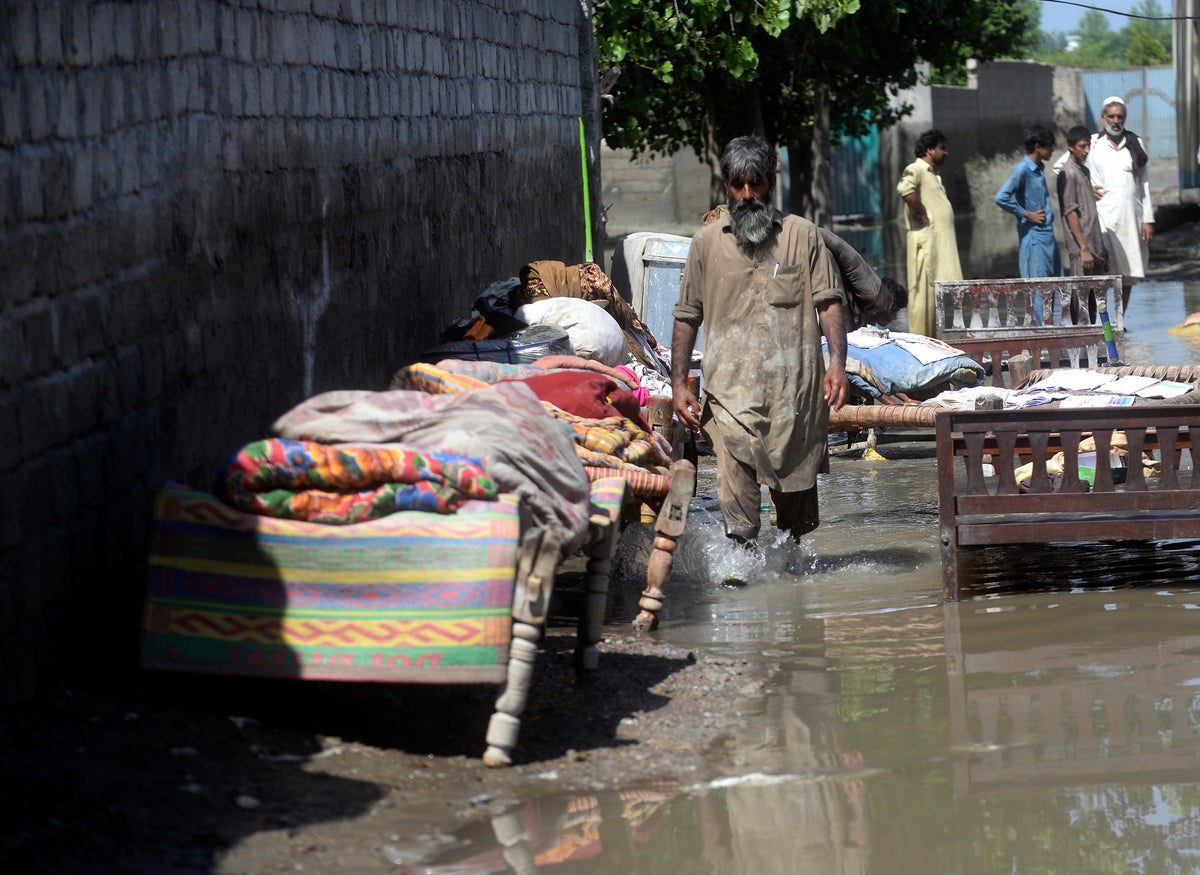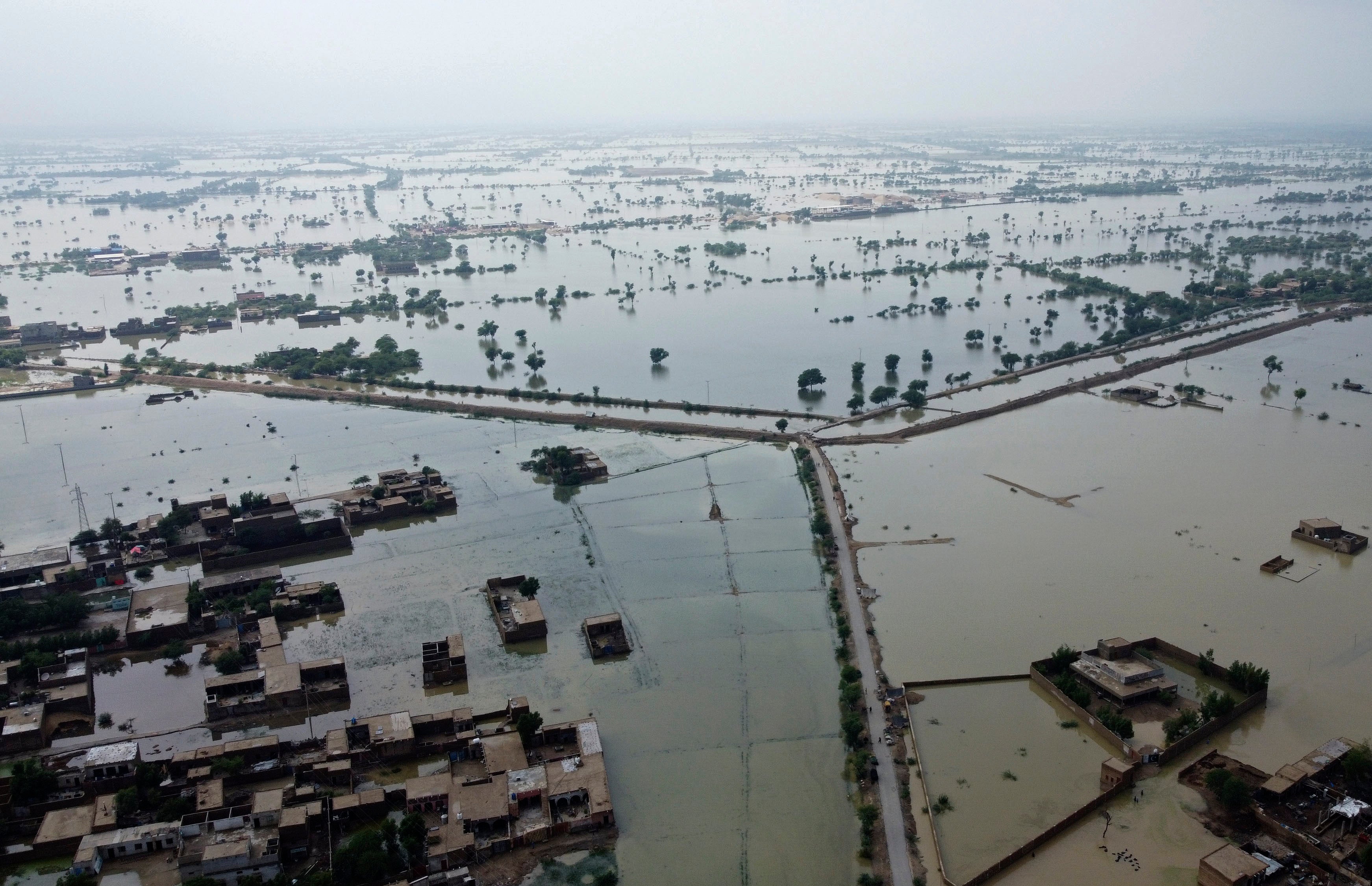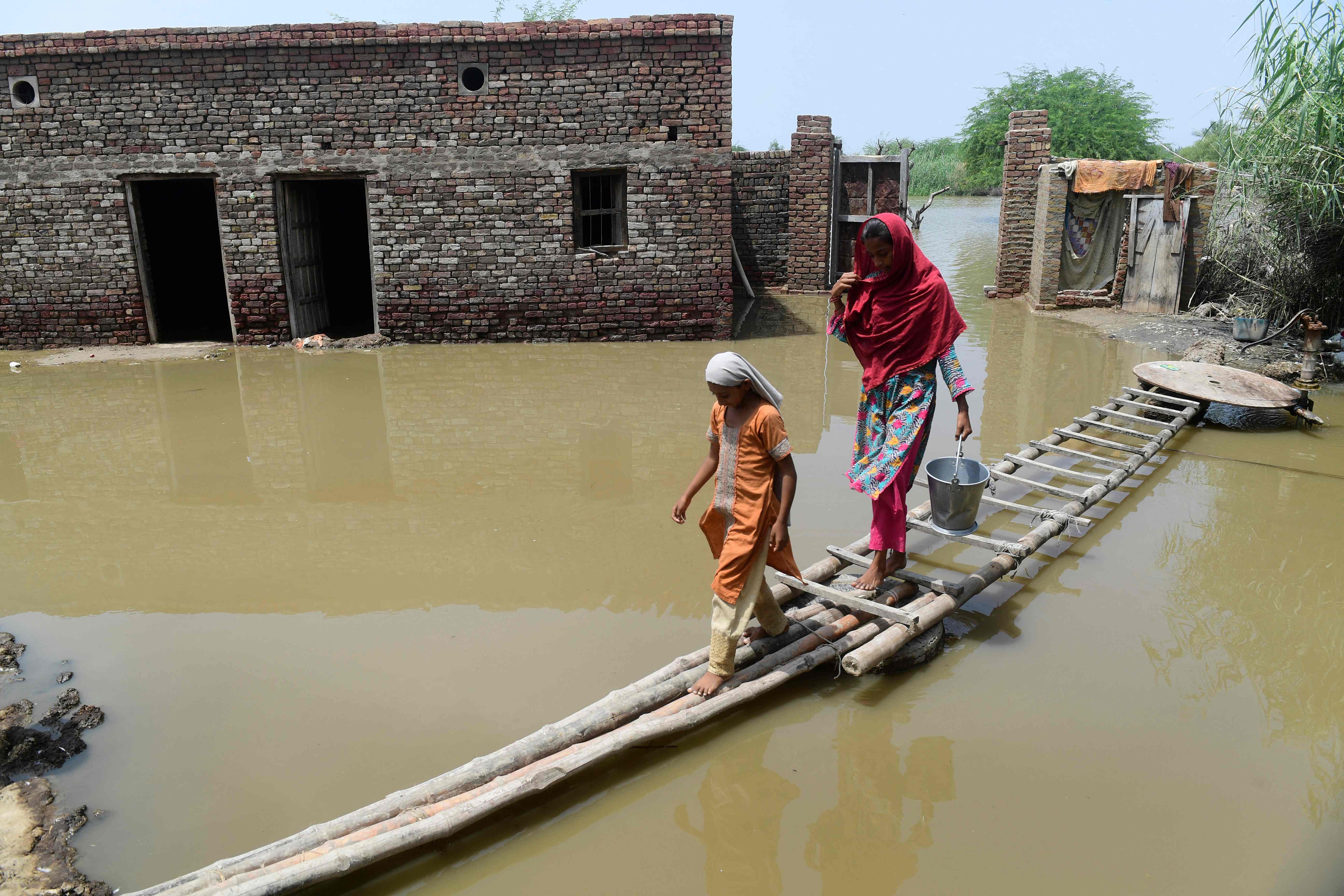
Approximately one third of Pakistan is currently lying underwater after the South Asian country was hit by flooding the likes of which has not been seen for 30 years, according to prime minister Shehbaz Sharif.
“There is an ocean of floodwater everywhere,” Mr Sharif told the AFP news agency during a visit to the devastated northern town of Charsadda. “I saw floodwater everywhere, wherever I went in recent days and even today.”
Cargo planes delivering humanitarian aid from the likes of Turkey and the UAE have begun to arrive, the premier assured his citizens, with more to follow as the UN appeals for further assistance from the international community.
A “monster” monsoon season, hammering the country with multiple cycles of heavy downpours since June, is being blamed for the calamitous flooding, which has so far killed more than 1,160 people, injured 1,636, damaged 1 million homes and forced hundreds of thousands of people to flee to the 4,210 relief camps set up so far, according to Pakistan’s National Disaster Management Authority.
Other displaced people are thought to be living with relatives, friends or on the streets.
Experts warn the devastation this year is likely to prove worse than that seen during the 2010 floods, in which almost 1,700 people died, with the risk of sickness from waterborne diseases now presenting fresh cause for concern.
Rescue operations are meanwhile being hampered by the damage done to more than 150 bridges and numerous roads, many of which have simply been washed away.
Planning minister Ashan Iqbal has said that initial estimates indicate that the cost of repairing such vital infrastructure is expected to reach $10bn (£8.6bn) but might ultimately prove to be “far greater”.
General Qamar Bajwa, the country’s military chief, said it would take years for Pakistan to recover while climate minister Sherry Rehman characterised the situation as “a catastrophe of unprecedented proportions.”
“What we saw recently in the last eight weeks is unrelenting cascades of torrential rain that no monsoon has ever brought with it ever before,” she said, blaming the climate crisis for the chaos and the associated heatwaves, forest fires and glacial lake outbursts that have likewise blighted the country this summer.
Pakistan was particularly hard hit for a number of reasons, from 400 per cent increases in average annual rainfall in areas like Baluchistan and Sindh, which caused at least 20 dams to burst, to the relentless heat, which brought temperatures above 45C throughout much of May and 50C in places like Jacobabad and Dadu, the warmer air also allowing for greater moisture retention.

In addition to its rivers swelling because of all the additional rain, Pakistan’s flash flooding was further exacerbated by the long-term melting of the glaciers of the Himalayas, which sent further water racing downhill to contribute to the deluge.
“We have the largest number of glaciers outside the polar region, and this affects us,” Ms Rehman said.
“Instead of keeping their majesty and preserving them for posterity and nature. We are seeing them melt.”
She admits that, while the country expects heavy summer rains, “We do expect them spread out, usually over three months or two months”, noting that the monsoon season is not usually so prolonged.
“It’s been eight weeks and we are told we might see another downpour in September.”
While many scientists would argue that it is too soon to say for certain that the climate crisis is to blame for Pakistan’s ordeal this summer – not without completing the necessarily intricate calculations comparing the established facts with theoretical modelling of a world without global heating – the signs are all there.
Such a study is expected in a few weeks and will formally determine to what extent the climate emergency has been behind the disaster.
That said, Abid Qaiyum Suleri, executive director of the Sustainable Development Policy Institute and a member of Pakistan’s Climate Change Council, has already pointed out that this summer’s rainfall ran at “more than 780 per cent above average levels”.
“Extreme weather patterns are turning more frequent in the region and Pakistan is not an exception,” he said.
Also prepared to make a definite statement at this early stage has been Anjal Prakash, research director at India’s Bharti Institute of Public Policy, who said explicitly that the flooding in Pakistan is “an outcome of the climate catastrophe” that could have been anticipated because it was “looming very large”.

“Climate change must be playing a role,” agreed Fahad Saeed, a scientist at Climate Analytics based in Islamabad, telling Axios that the extreme rain of 2010 played out over just three days, whereas the conditions that have brought about the present disaster have been in motion since April.
Mr Saaed adds that his own study carried out earlier this summer indicated that May’s heatwave was at least 1C hotter than it might have been without man-made greenhouse gases polluting the atmosphere.
What makes all of this particularly tragic is that, since 1959, Pakistan has been responsible for just 0.4 per cent of the world’s historical CO2 emissions, compared to the US (21.5 per cent), China (16.5 per cent) and the EU (15 per cent) to give three of the most prominent examples.
“Those who are stranded at the moment, they had nothing to contribute to climate change and still they are there, under the open skies,” Mr Saaed said.
Speaking to the Associated Press, Ms Rehman agreed: “Climate knows no borders and its effects can be disproportionately felt.
“When you see low pressure systems coming from the Bay of Bengal, they hit us before anyone else. So we’re on the front line of a global crisis.”
Additional reporting by agencies







